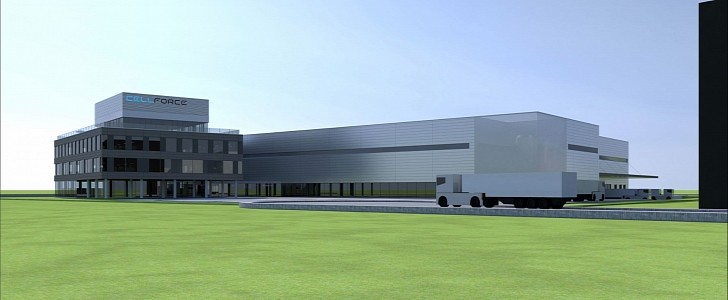Cellforce, the joint venture between Porsche and Customcells, has announced it has chosen the location for its upcoming factory. It will be positioned in Germany, near Stuttgart, and it will make high-performance battery cells. The constrution of the factory starts next year.
Once the production facility is finalized and running, it will initially produce battery cells for just 1,000 vehicles per year, but the planned production capacity will be 100 MWh per year, which means that it will roll out mass production later.
The year 2024 will bring this hike in production to meet increased demand. By 2025, the company will grow its workforce four-fold, from the current 23 employees to about 100 people.
As company officials announce, the high-performance battery cells made by Cellforce will likely be installed in electric Porsche models. With that in mind, it is easy to understand why the new facility was positioned in the Stuttgart area.
Due to its strategic location, the factory will be close both to the Weissach research center, Porsche's factories, and even other important companies from the automotive industry. Proximity to one of its largest potential customers will both help speed up delivery times, and reduce the carbon footprint of the supply chain.
Initially, the factory was supposed to be constructed near a town called Tübingen, where the company already had a facility. Plans have evolved in a different direction since then, and the shareholders of the two companies that have formed the joint venture have decided on the North Reutlingen/Kirchentellinsfurt industrial estate.
With the new position of the factory decided, all that is left is to construct a factory on the 28,151-square-meter site. The Federal Republic of Germany, along with the state of Baden-Württemberg, is funding the project that is estimated at 60 million euros. Their goal is to help create a competitive value chain for lithium-ion batteries in Europe.
The new cells developed by Cellforce use silicone as their anode material, which allows engineers to increase the power density when compared to current technologies. That means that smaller batteries can be made while maintaining current capacity and performance levels.
Moreover, the new battery chemistry allows these high-performance cells to absorb more energy than currently possible with existing cells. That will bring both a rise in performance for fast-charging purposes, but also during energy recuperation. According to Cellforce, the new cells are also more resistant to high temperatures than conventional ones.
The year 2024 will bring this hike in production to meet increased demand. By 2025, the company will grow its workforce four-fold, from the current 23 employees to about 100 people.
As company officials announce, the high-performance battery cells made by Cellforce will likely be installed in electric Porsche models. With that in mind, it is easy to understand why the new facility was positioned in the Stuttgart area.
Due to its strategic location, the factory will be close both to the Weissach research center, Porsche's factories, and even other important companies from the automotive industry. Proximity to one of its largest potential customers will both help speed up delivery times, and reduce the carbon footprint of the supply chain.
Initially, the factory was supposed to be constructed near a town called Tübingen, where the company already had a facility. Plans have evolved in a different direction since then, and the shareholders of the two companies that have formed the joint venture have decided on the North Reutlingen/Kirchentellinsfurt industrial estate.
With the new position of the factory decided, all that is left is to construct a factory on the 28,151-square-meter site. The Federal Republic of Germany, along with the state of Baden-Württemberg, is funding the project that is estimated at 60 million euros. Their goal is to help create a competitive value chain for lithium-ion batteries in Europe.
The new cells developed by Cellforce use silicone as their anode material, which allows engineers to increase the power density when compared to current technologies. That means that smaller batteries can be made while maintaining current capacity and performance levels.
Moreover, the new battery chemistry allows these high-performance cells to absorb more energy than currently possible with existing cells. That will bring both a rise in performance for fast-charging purposes, but also during energy recuperation. According to Cellforce, the new cells are also more resistant to high temperatures than conventional ones.






